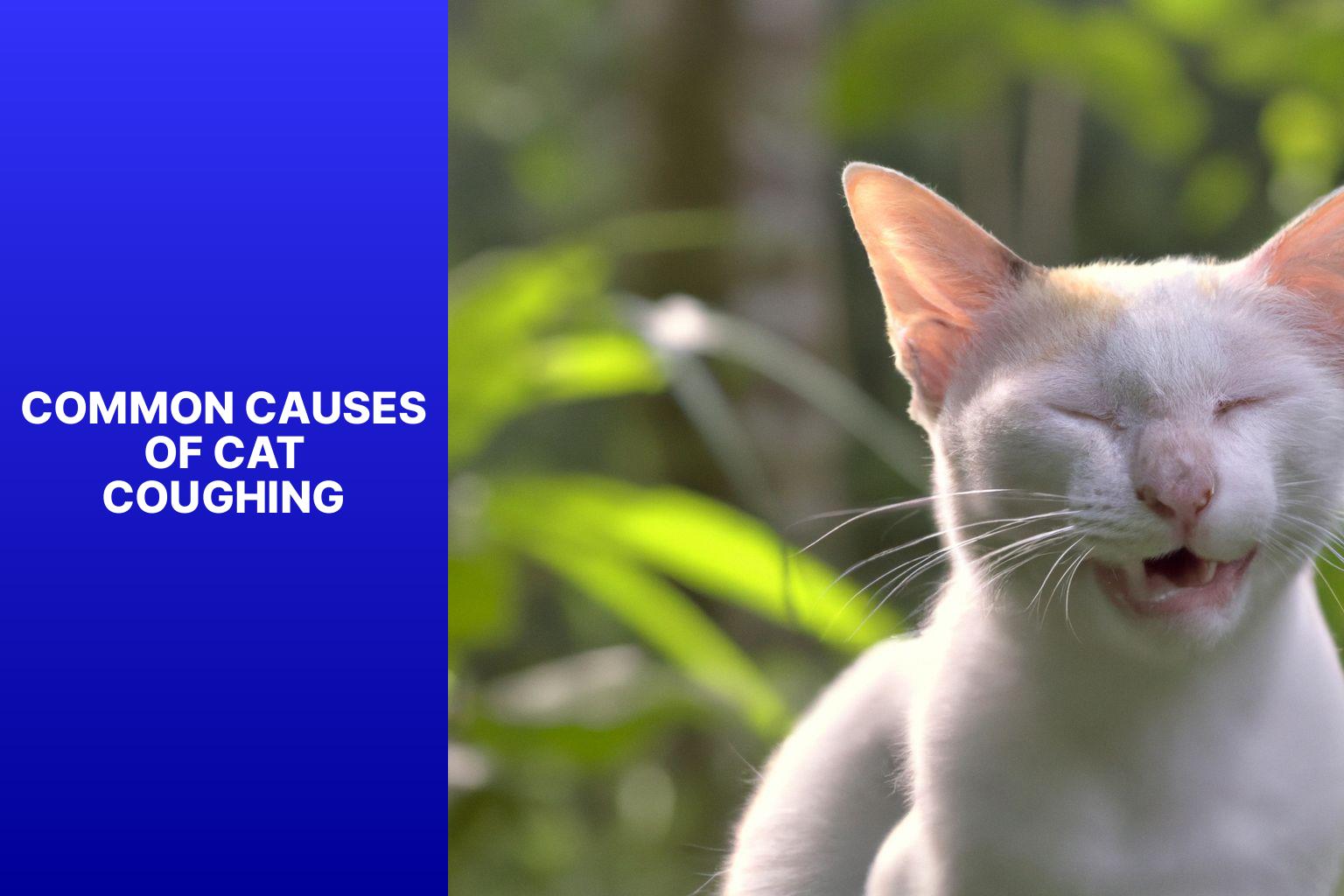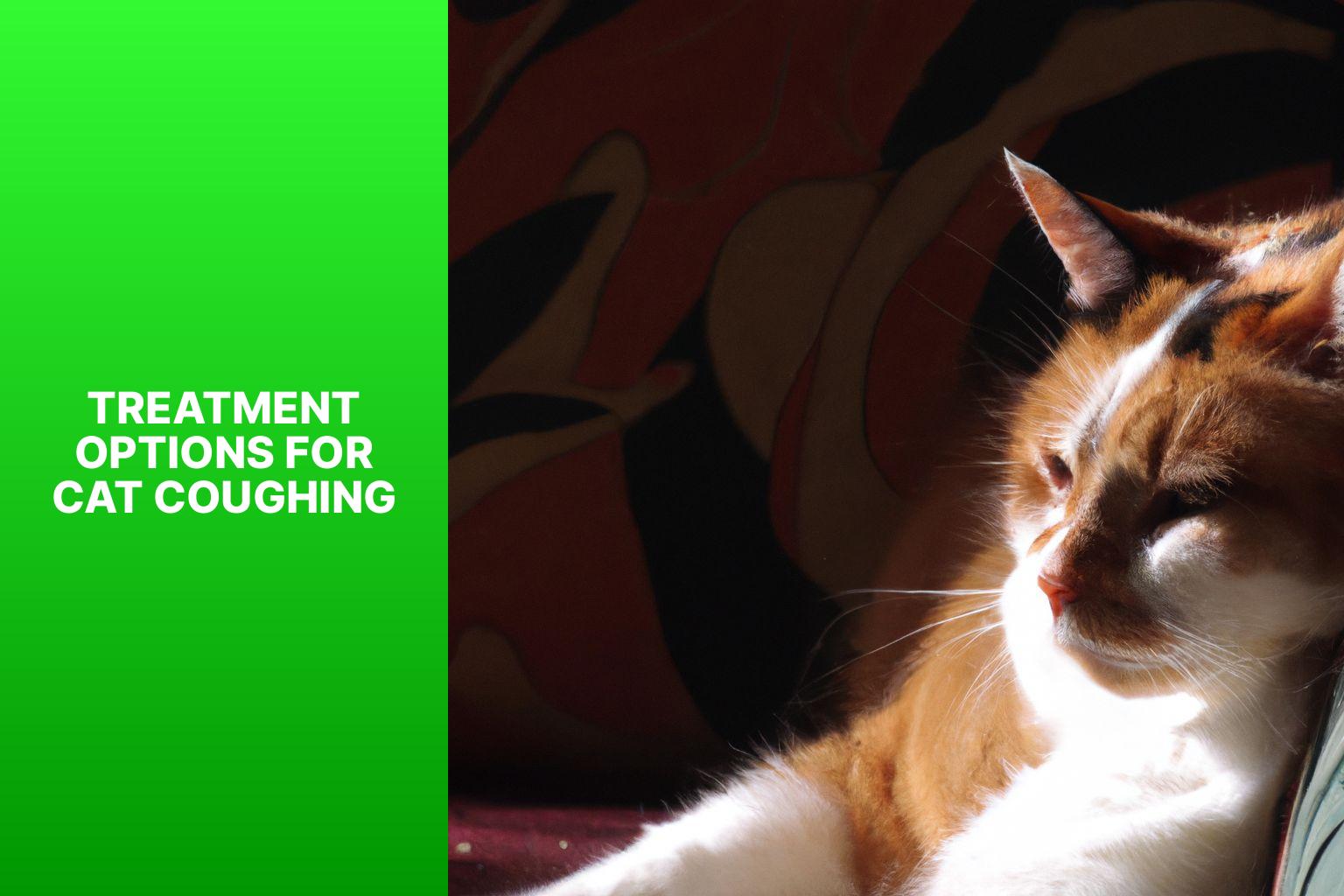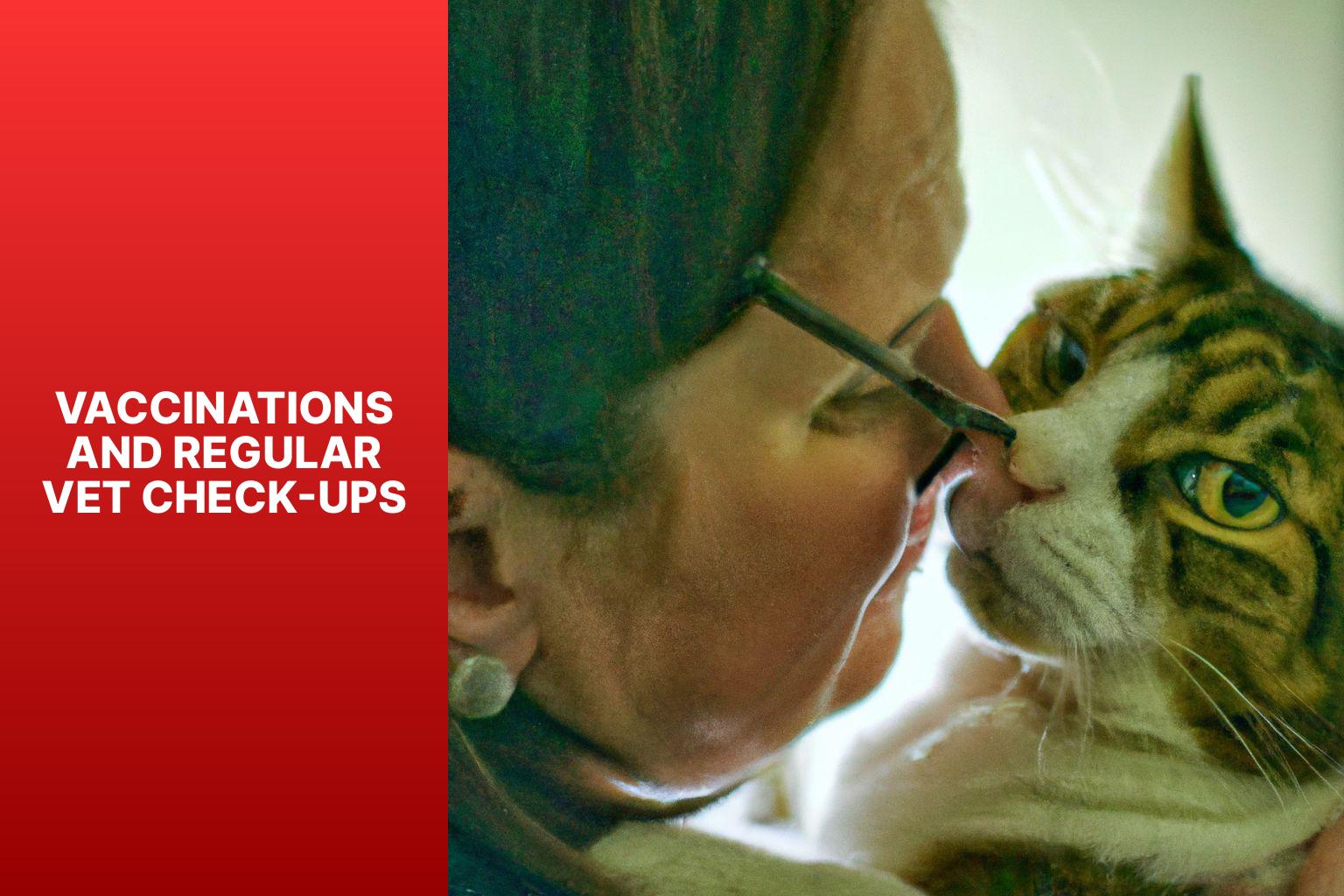Coughing is a common symptom that cats may experience, and it can be concerning for pet owners. Understanding the causes and potential implications of cat coughing is essential in order to provide proper care for your furry friend.
When it comes to cat coughing, there can be a variety of underlying factors. Respiratory infections, allergies, asthma, heart disease, and foreign objects in the throat are some of the common causes. Another potential cause is a lungworm infection. It’s important to be aware of these causes and their symptoms to properly address the issue and provide the necessary treatment.
While occasional coughing may not be a cause for immediate concern, there are certain indicators that should be taken seriously. A persistent or worsening cough, difficulty breathing, or coughing up blood or unusual discharge are red flags that warrant veterinary attention.
To determine the cause of your cat’s coughing, a veterinarian may perform a physical examination, as well as conduct diagnostic tests such as X-rays, ultrasounds, or blood tests.
Treatment options for cat coughing will vary depending on the underlying cause. Medications may be prescribed to treat infections or allergies, while heart medications might be necessary for heart disease. In some cases, surgical intervention may be required to remove a foreign object or address other issues.
Prevention plays a crucial role in maintaining your cat’s respiratory health. Regular vaccinations and vet check-ups are essential, along with environmental allergen control and heartworm prevention measures.
By understanding cat coughing and taking appropriate measures, you can ensure the well-being of your feline companion and provide them with the necessary care to alleviate their symptoms and restore their health.
Key takeaway:
- Understanding Cat Coughing: Recognizing the symptoms and causes of cat coughing is essential for proper diagnosis and treatment.
- Common Causes of Cat Coughing: Respiratory infections, allergies, asthma, heart disease, and foreign objects in the throat are some common causes of cat coughing.
- When to Be Concerned About Cat Coughing? Persistent or worsening cough, difficulty breathing, and coughing up blood or unusual discharge are red flags that require immediate attention.
- Diagnosing the Cause of Cat Coughing: A thorough physical examination, x-rays or ultrasound, and blood tests are common diagnostic methods for determining the cause of cat coughing.
- Treatment Options for Cat Coughing: Medications for infections or allergies, heart medications, removal of foreign objects, and environmental allergen control are some treatment options for cat coughing. Vaccinations, regular vet check-ups, and heartworm prevention are also important preventive measures.
Understanding Cat Coughing
To ensure the health and well-being of their pets, cat owners should have a thorough understanding of cat coughing. There are various reasons why a cat may cough, including respiratory infections, allergies, asthma, heart disease, feline bronchitis, and feline infectious peritonitis (FIP).
Respiratory infections, whether viral or bacterial, can lead to coughing in cats. Similarly, allergies to substances such as pollen, dust mites, or certain foods can trigger coughing episodes. Asthma, a condition also found in humans, can cause cats to experience coughing, wheezing, and difficulty breathing.
Heart disease can be a serious cause of cat coughing as it can result in fluid buildup in the lungs. Feline bronchitis, characterized by chronic inflammation of the airways, can also lead to persistent coughing. FIP, a viral disease that affects multiple organs including the respiratory system, may be responsible for coughing in cats.
If you notice that your cat is coughing, it is crucial to consult a veterinarian for a proper diagnosis and appropriate treatment. The underlying cause of the coughing will determine the most suitable course of action to improve your cat’s health.
Common Causes of Cat Coughing
Photo Credits: Www.Catcornerblog.Com by Peter Robinson
Cat coughing can be a cause for concern, but understanding the common causes can help put our minds at ease. In this section, we’ll explore the various factors that may contribute to feline coughing. From respiratory infections to allergies and asthma, we’ll uncover the potential culprits that can lead to these unsettling symptoms. We’ll delve into heart disease, foreign objects in the throat, and lungworm infection as further possible causes. Stay informed and keep your feline friends healthy!
Respiratory Infections
Respiratory infections in cats can be caused by a variety of factors, including viruses, bacteria, fungi, and even parasites. These infections can lead to a range of symptoms, including coughing, sneezing, nasal discharge, fever, difficulty breathing, and respiratory distress.
Common viral infections that affect cats’ respiratory systems include feline herpesvirus and feline calicivirus. These viruses can cause symptoms such as coughing, sneezing, nasal discharge, and fever. On the bacterial front, well-known offenders like Bordetella bronchiseptica or Mycoplasma spp. can lead to coughing, difficulty breathing, and the production of thick mucus. Fungal infections, such as cryptococcosis or aspergillosis, can also invade a cat’s respiratory system and result in coughing, nasal discharge, and respiratory distress.
Lungworms are parasites that can infect the respiratory tract of cats, causing coughing and other respiratory symptoms. These infections are typically transmitted through the ingestion of infected prey.
If you notice that your cat is coughing or showing other signs of a respiratory infection, it’s vital to seek veterinary care for an accurate diagnosis and appropriate treatment. A veterinarian will likely conduct a physical examination, recommend diagnostic tests such as blood tests or X-rays, and prescribe the necessary medications, such as antibiotics or antifungal drugs, to help your cat recover.
Allergies and Asthma
Allergies and asthma cause cat coughing. Cats can develop allergies to substances like pollen, dust mites, or certain foods. When a cat is exposed to an allergen, their immune system overreacts, causing coughing. Asthma is a respiratory condition that inflames and narrows the airways, leading to coughing and difficulty breathing.
If your cat has allergies or asthma, seek veterinary care. The veterinarian will examine your cat and may recommend tests like blood tests or X-rays to identify the cause of the coughing. Once the cause is known, treatment options for allergies and asthma can be discussed.
Treating allergies and asthma in cats may involve medications to reduce inflammation and control reactions. These can include antihistamines, corticosteroids, or bronchodilators. In some cases, reducing exposure to allergens in the cat’s environment may be necessary.
It’s important to follow the veterinarian’s advice and treatment plan to effectively manage allergies and asthma. Regular check-ups and monitoring are also necessary to ensure that allergies and asthma are well-controlled and make any necessary adjustments to the treatment plan. With proper care, cats with allergies and asthma can have happy and comfortable lives.
Heart Disease
Heart disease in cats is a potentially serious health issue that should not be taken lightly. Recognizing the signs and symptoms of this condition is crucial for effective treatment. A combination of genetic factors and high blood pressure can be responsible for the development of heart disease in feline companions. Common indications of this ailment include coughing, difficulty breathing, and lethargy.
Upon diagnosis, it is vital for the veterinarian to examine the cat’s heart function thoroughly. Additional tests such as X-rays or ultrasounds may be recommended to obtain a more accurate understanding. Blood tests can also be conducted to check for any underlying conditions that may contribute to the development of heart disease.
Treatment for heart disease in cats typically involves the administration of medication to manage symptoms and improve heart function. In some cases, surgical intervention may be necessary. It is crucial for cat owners to diligently follow the veterinarian’s recommendations and ensure that the prescribed medication is given as directed.
Adopting preventive measures is key in combating heart disease in cats. Regular check-ups and vaccinations, as well as controlling allergens, can go a long way in preventing the onset of this condition. Taking preventative measures against heartworm is essential. Being proactive and seeking prompt veterinary care can significantly enhance a cat’s prognosis and overall quality of life in regards to heart disease.
Foreign Object in the Throat
When a foreign object in the throat of a cat occurs, it can cause discomfort and coughing. Here are some steps to address this issue:
1. Observe Symptoms: Look for signs of coughing or retching in your cat. These symptoms can indicate the presence of a foreign object in their throat.
2. Assess Severity: If your cat can breathe normally, attempt simple measures at home. If breathing becomes difficult or your cat shows signs of distress, it is important to seek immediate veterinary assistance.
3. Examine the Mouth: Carefully open your cat’s mouth and visually inspect for any foreign objects. Be cautious as cats may become anxious or aggressive during mouth examination.
4. Encourage Coughing: Gently pat your cat’s chest or back to encourage coughing and dislodging the object. Avoid forcefully hitting or squeezing your cat.
5. Use Gravity: If the object is small and not causing severe distress, tilt your cat’s head downward to aid in the object sliding out.
Remember, if your attempts are unsuccessful or your cat’s condition worsens, it is crucial to consult a veterinarian immediately.
Lungworm Infection
Lungworm infection is a common cause of coughing in cats. Cats can become infected with lungworms by swallowing larvae or by coming into contact with small snails that carry the parasite. Once inside the cat’s body, the larvae migrate to the lungs and cause inflammation, leading to respiratory symptoms.
Coughing is a prominent sign of lungworm infection in cats. This coughing is often accompanied by difficulty breathing and wheezing. If your cat experiences persistent or worsening coughing, it is important to seek veterinary attention.
To diagnose lungworm infection, a veterinarian will typically perform a physical examination and may order tests such as a fecal examination to check for the presence of lungworm larvae. Treatment for lungworm infection involves using medications that will eliminate the parasites and alleviate respiratory symptoms.
Preventing lungworm infection in cats is crucial. Regular deworming with medications that specifically target lungworms can help reduce the risk of infection. Minimizing your cat’s contact with snails or slugs can also help lower the chances of contracting lungworms.
When to Be Concerned About Cat Coughing?
Cat coughing can be a cause for concern, especially when certain symptoms are present. In this section, we will uncover when cat owners should be vigilant about their furry friends’ coughing. From persistent or worsening coughs to difficulty breathing and even coughing up blood or unusual discharge, we’ll explore the warning signs that necessitate immediate attention. Stay tuned as we delve into these crucial indicators and help you become better equipped to address your cat’s coughing episodes.
Persistent or Worsening Cough
Persistent or worsening cough in cats may indicate an underlying health issue. It is important to take action and seek veterinary attention if your cat has a persistent or worsening cough. Ignoring the cough can lead to further complications and discomfort for your cat.
The causes of a persistent or worsening cough in cats can vary. These include respiratory infections, allergies and asthma, heart disease, foreign objects in the throat, or lungworm infections. It is crucial to have your cat diagnosed by a veterinarian to determine the cause of the cough.
Once the cause is identified, the veterinarian will recommend appropriate treatment options for managing the persistent or worsening cough. These may include medications for infections or allergies, heart medications, or surgical intervention to remove foreign objects. It is important to follow the treatment plan prescribed by the veterinarian to alleviate the cough and improve your cat’s well-being.
In fact, my own cat, Whiskers, developed a persistent cough that worsened over time. After a thorough examination, the vet diagnosed her with a respiratory infection. With the prescribed medications and care, Whiskers’ cough gradually improved, and she regained her playful and energetic self. Remember, early intervention is key for your cat’s health.
#”Keep tags intact, if found.”
Difficulty Breathing
When a cat has trouble breathing, it can indicate a serious underlying condition that needs immediate attention. Prompt action is crucial for the cat’s well-being.
Potential causes of breathing difficulties in cats are respiratory infections, allergies, asthma, heart disease, foreign objects in the throat, or lungworm infections. If your cat struggles to breathe, it’s important to seek veterinary care for diagnosis and appropriate treatment.
In case your cat is having difficulty breathing, stay calm and observe its breathing pattern. Look out for additional symptoms like coughing, wheezing, or blue gums. If your cat’s breathing becomes labored or if it can’t catch its breath, seek emergency veterinary care.
Your veterinarian may conduct a physical examination, x-rays or ultrasound, and blood tests to diagnose the cause of the breathing difficulty. Once the cause is identified, suitable treatment options can be recommended. This may include medications for infections or allergies, heart medications, or surgical intervention for foreign objects.
Pro-tip: Regular veterinary check-ups and preventive measures like vaccinations and heartworm prevention can reduce the risk of respiratory issues in cats. Keeping your cat’s environment allergen-free can help alleviate respiratory symptoms.
Coughing Up Blood or Unusual Discharge
Coughing up blood or unusual discharge in cats is a serious symptom that should not be ignored. This symptom could indicate a severe underlying problem that needs immediate attention. Blood or unusual discharge in cough can indicate respiratory infections, lungworm infection, or a foreign object stuck in the throat. If you notice your cat coughing up blood or unusual discharge, take them to a vet for an examination.
During the examination, the vet may perform tests to check for injury or infection in the respiratory system. X-rays or ultrasounds may be done to examine the lungs and throat. Blood tests may also be done to check for infections or abnormalities.
Treatment for cats coughing up blood or unusual discharge depends on the underlying cause. Medications may be prescribed for infections and allergies. Heart medications may be necessary for heart disease. If a foreign object is stuck in the throat, surgical removal may be required.
To prevent cats from coughing up blood or unusual discharge, regular vaccinations and vet check-ups are crucial. Controlling environmental allergens can reduce the chances of allergies triggering coughing episodes. Using heartworm prevention medications can also minimize the risk of heartworm disease, which can cause coughing in cats.
If your cat is coughing up blood or unusual discharge, seek veterinary attention promptly to ensure proper diagnosis and treatment.
Diagnosing the Cause of Cat Coughing
When it comes to our feline friends, coughing can be a concerning symptom. In this section, we will dive into the process of diagnosing the cause of cat coughing. From a thorough physical examination to the use of X-rays or ultrasound, and even blood tests, we will explore the various methods that veterinarians employ to uncover the underlying factors behind this common issue. Get ready to uncover the secrets behind your cat’s cough!
Physical Examination
A physical examination is crucial for diagnosing cat coughing. The process of a physical examination includes the following steps:
- The veterinarian carefully observes the cat’s appearance, behavior, and breathing.
- They gently palpate the cat’s chest and abdomen to detect any abnormalities or signs of pain.
- The veterinarian utilizes a stethoscope to listen to the cat’s heart and lungs, checking for any unusual sounds.
- They might also measure the cat’s temperature to rule out any potential infections.
- The veterinarian thoroughly examines the cat’s nose, mouth, and throat for any signs of inflammation or foreign objects.
- They meticulously inspect the cat’s lymph nodes for any swollen or enlarged glands.
- If necessary, the veterinarian may examine the cat’s ears and eyes for indications of infection.
- The veterinarian assesses the cat’s skin and coat for any abnormalities or signs of allergies.
A physical examination is an essential initial step in determining the cause of cat coughing. It helps assess the cat’s overall health and identify any underlying conditions. Based on the examination findings, further diagnostic tests may be recommended to confirm the diagnosis and establish an appropriate treatment plan.
X-rays or Ultrasound
X-rays and ultrasound are valuable diagnostic tools for identifying the cause of cat coughing.
These techniques, X-rays and ultrasound, provide detailed images of the chest area and examine the heart and lungs, respectively.
By utilizing X-rays and ultrasound, abnormalities, potential causes, masses, fluid buildup, or other issues causing the coughing can be visualized.
These non-invasive techniques are generally well-tolerated by cats and are recommended by veterinarians when other tests, like blood tests, are inconclusive.
X-rays or ultrasound, depending on the case and the veterinarian’s judgment, guide treatment decisions by targeting the underlying cause of the coughing.
Thus, X-rays and ultrasound play a crucial role in diagnosing the cause of cat coughing and providing insights for effective treatment.
Blood Tests
Blood test are essential in diagnosing the cause of cat coughing. There are different types of blood tests that can evaluate the cat’s health:
1. Feline Infectious Disease Tests: These tests are capable of detecting infections like feline leukemia virus (FeLV) and feline immunodeficiency virus (FIV), which can weaken the immune system and contribute to respiratory issues.
2. Complete Blood Count (CBC): A CBC provides information regarding the cat’s overall health, including red blood cell count, white blood cell count, and platelet count. Irregularities in these counts can indicate various health conditions.
3. Biochemical Profile: A biochemical profile measures the levels of different substances in the blood, such as liver enzymes and kidney function indicators. Irregularities in these levels can indicate underlying health problems.
4. Allergy Tests: Allergy tests can assist in identifying specific allergens that may trigger respiratory symptoms in cats, resulting in coughing.
If your cat is experiencing coughing or other respiratory symptoms, it is advisable to consult a veterinarian who can perform blood tests to determine the underlying cause. Blood tests provide valuable insights and help guide appropriate treatment options for your cat’s specific condition.
Treatment Options for Cat Coughing
Photo Credits: Www.Catcornerblog.Com by Jonathan Green
When it comes to treating cat coughing, there are various options to consider. From medications for infections or allergies to heart medications, the goal is to alleviate your furry friend’s discomfort. In some cases, removal of foreign objects or surgical intervention may be necessary. Environmental allergen control and heartworm prevention play a vital role in maintaining your cat’s respiratory health. Let’s take a closer look at these treatment options and explore how they can make a difference for your coughing cat.
Medications for Infections or Allergies
When treating cat coughing caused by infections or allergies, several medications for infections or allergies can be utilized:
- Antibiotics: If the coughing is a result of a bacterial infection, such as bronchitis or pneumonia, antibiotics for infections may be prescribed to eliminate the infection.
- Antivirals: In cases where the coughing is caused by a viral infection, antiviral medications for infections may be used to control the infection and alleviate symptoms.
- Antihistamines: Allergies can cause coughing in cats, and antihistamines for allergies are commonly used to relieve allergic symptoms. They work by blocking the effects of histamine, a chemical released during an allergic reaction.
- Corticosteroids: These medications for allergies are powerful anti-inflammatory drugs that can reduce airway inflammation and relieve coughing caused by allergies. They may be prescribed as oral medications or inhalers.
The specific medication and dosage will depend on the underlying cause of the coughing and the cat’s health condition. Always consult with a veterinarian to determine the most appropriate treatment plan for your cat.
I once had a cat named Whiskers who developed a persistent cough. After a visit to the vet, it was determined that she had a respiratory infection. The vet prescribed antibiotics for infections to treat the infection, and after a week of medication, Whiskers’ coughing subsided. It was a relief to see her regain her energy and no longer struggle with coughing fits. Regular check-ups and prompt treatment with the right medications made all the difference in her recovery.
Heart Medications
Heart medications are crucial for treating cat coughing caused by heart disease. They play a vital role in managing symptoms and enhancing heart function.
Diuretics, such as furosemide, are prescribed to reduce fluid buildup and swelling in the lungs and body. ACE inhibitors, like enalapril, are used to dilate blood vessels and lower blood pressure. Beta-blockers, such as atenolol, are employed to slow the heart rate and reduce strain on the heart.
In certain situations, anti-arrhythmic medications may be recommended to regulate irregular heart rhythms. It is important to have regular veterinary check-ups to monitor the cat’s response to the heart medications and make any necessary adjustments.
It is crucial to administer heart medications only under the guidance of a veterinarian, following the prescribed dosage and frequency based on the cat’s condition. These medications have a significant impact on improving the quality of life for cats with heart disease and help to alleviate coughing symptoms caused by the condition.
Removal of Foreign Object or Surgical Intervention
The removal of a foreign object or surgical intervention is necessary for effectively treating cat coughing caused by an obstruction or underlying issue. To address this, here are the steps involved in the process:
1. Evaluation: The veterinarian will thoroughly examine the cat to determine if there is a foreign object present or if surgical intervention is needed.
2. Imaging: X-rays or ultrasound may be utilized to locate and analyze the foreign object or assess the condition that requires surgical intervention.
3. Anesthesia: If surgical intervention is deemed necessary, the cat will be placed under anesthesia for a safe and painless procedure.
4. Surgical procedure: The veterinarian will perform the required surgery to remove the foreign object or address the underlying issue that is causing the coughing.
5. Recovery: Following the surgery, close monitoring of the cat will be conducted to ensure a smooth recovery. Pain medication and post-operative care instructions may also be provided.
6. Follow-up: The veterinarian may schedule follow-up appointments to observe the cat’s progress and make any necessary adjustments to the treatment plan.
By adhering to these steps, the removal of a foreign object or surgical intervention can effectively alleviate cat coughing and enhance the cat’s health and well-being.
Vaccinations and Regular Vet Check-ups
Photo Credits: Www.Catcornerblog.Com by Peter Gonzalez
Vaccinations and regular vet check-ups play a vital role in maintaining your cat’s health. These vaccinations not only enhance their immunity but also safeguard them against infectious diseases. Routine check-ups enable early detection of any health issues and ensure prompt treatment. It is crucial to stay updated with these vaccinations and check-ups to ensure your cat’s optimal well-being.
During the vaccination process, specific vaccines are administered to prevent diseases such as feline calicivirus, feline herpesvirus, and rabies. These vaccines are essential for protecting your cat’s overall well-being. Regular check-ups thoroughly examine your cat’s health, identify any signs of illness, and provide preventive care as needed.
By diligently following your vet’s recommended vaccination schedule and bringing your cat for regular check-ups, you greatly reduce the risk of diseases and ensure a high quality of life for your feline companion. Vaccinations and check-ups are essential for ensuring your cat’s long-term health and happiness.
Environmental Allergen Control
To effectively control environmental allergens in order to alleviate your cat’s coughing, it is important to take the following steps:
1. Thoroughly identify the specific environmental allergens that are triggering your cat’s coughing episodes.
2. Ensure that the living area is regularly cleaned and maintained in order to eliminate any dust or mold that may serve as allergens.
3. Utilize air purifiers or filters to effectively eliminate and eradicate allergens from the air within your cat’s surroundings.
4. Regularly wash bedding and toys to prevent the accumulation of allergens.
5. Minimize exposure to potential allergens, such as pollen or cigarette smoke, to alleviate your cat’s symptoms.
6. Consider utilizing hypoallergenic cleaning products that are specifically designed to minimize allergens in your cat’s environment.
7. Seek professional advice and consult with a veterinarian in order to receive additional guidance and recommendations regarding environmental allergen control, as well as potential medications that may help alleviate your cat’s coughing.
By implementing these measures consistently, you will successfully diminish environmental allergens in your cat’s surroundings, ultimately reducing the frequency of coughing episodes and providing a healthier environment for your feline companion.
Heartworm Prevention
Heartworm prevention is crucial for cat health. Here are some measures to prevent heartworm infection:
- Administer monthly preventative medication: Ask your veterinarian about appropriate heartworm preventative medication for your cat. These medications come in chewable tablets or topical treatments and effectively prevent heartworm infection.
- Keep your cat indoors: Indoor cats have a lower risk of contracting heartworms compared to outdoor cats. Limit your cat’s exposure to mosquitoes, which transmit heartworm larvae, to reduce infection chances.
- Eliminate mosquito breeding grounds: Mosquitoes are the primary carriers of heartworm larvae. Reduce the mosquito population around your home by eliminating standing water and maintaining cleanliness.
- Use mosquito repellent: Apply cat-specific mosquito repellent when your cat goes outdoors, especially during peak mosquito activity times like dawn and dusk. This provides additional protection against heartworm transmission.
- Schedule regular veterinary check-ups: Monitor your cat’s health and discuss heartworm prevention strategies with your veterinarian. Additional preventive measures may be recommended based on your cat’s individual risk factors.
By following these measures, you can significantly reduce the risk of heartworm infection in your cat and ensure their well-being.
Some Facts About Why Is My Cat Coughing:
- ✅ Coughing in cats can be a sign of various health issues affecting their lungs, airway, or throat.
- ✅ Cats with ongoing or severe coughing should be examined by a veterinarian to determine the underlying cause.
- ✅ Feline asthma is the most common respiratory disorder in cats, especially those who spend time outdoors.
- ✅ Cats can also cough due to allergies, which may manifest as coughing, sneezing, or wheezing.
- ✅ Coughing in cats can be a symptom of fungal lung infections, heartworm disease, lung cancer, pneumonia, congestive heart failure, or tight collars.








